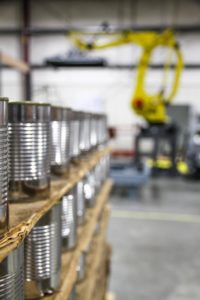Background
Bell-Carter Foods, Inc., based in Lafayette, California, has been producing and selling innovative, high-quality olive products for nearly a century. As the largest table olive producer in the United States, the company processes 60,000 tons of olives each year with distribution to food service and retail locations worldwide.
Challenge
By 2013, still utilizing a completely manual packaging process, Bell-Carter was experiencing a number of challenges. Not only had production rates reached a level that was difficult to keep up with, but the line did not meet latest ergonomic set-up requirements for machine operators who were risking injury loading, unloading and lifting heavy metal trays. The manual, often not very careful handling also left its marks on the trays in the form of bent flanges that increasingly hindered proper stacking.
While the struggle to keep up with continuously-growing market demand may seem like a good problem to have, it nevertheless was a serious challenge that needed to be overcome. A thorough internal examination of the company’s production process emphasized the need for major changes to reach desired output levels and to support future growth. Knowing automation was the logical next step, Bell-Carter turned to Pearson to help make sustainable improvements to their secondary packaging processes.
Solution
To overcome the aforementioned obstacles, Pearson Packaging Systems provided four robotic solutions: a Tray Loader, Tray Unloader, Case Loader and Palletizer. Using vacuum end-of-arm tooling, the Tray Loader, appropriately dubbed the “Pouchinator” picks up three pouches of olives at a time and places them into the tray until twelve pouches have been loaded. Once a tray is filled, another empty one is placed on top and the cycle continues. A completed stack is then sent to the “cooker” where the olives undergo a steam treatment. After emerging from the cooker, the trays are unloaded in a similar fashion as during the loading process. The Case Loader then packs the pouches in a lay-flat pattern into sturdy bliss boxes for shipment, which also provide the versatility to accommodate snack-size olive cups. Finally, the cases are stacked by the Palletizer and stretch wrapped for distribution to retail locations.
To account for future growth, the system is able to run slightly faster than currently needed (25 pouches/min vs. current rate of 22 pouches/min) and is capable of accommodating two lines if a second pouching machine is added in the future.

Results
Initially, Bell-Carter’s team of operators was concerned that adapting to the new robotic technology would prove extremely challenging not having any prior experience with robotic systems. In actuality, the transition went very smoothly as a result of extensive training and support services. All employees originally tasked to load, unload and stack trays have been redeployed to support other areas of the company.
Bob Asmus, Project Engineer at Bell-Carter, says the implementation of the robot has improved efficiency by 27 percent and significantly lowered manufacturing expenses. He also anticipates a substantial reduction in work-related injuries.
Pleased with the return on their investment, Bell-Carter soon entered into a follow-up automation project to add six additional robots, including three Robotic Depalletizers (RDPCs) able to accommodate standard and oversized olive cans as well as another three Robotic Palletizers (RPCs) in 2015.
